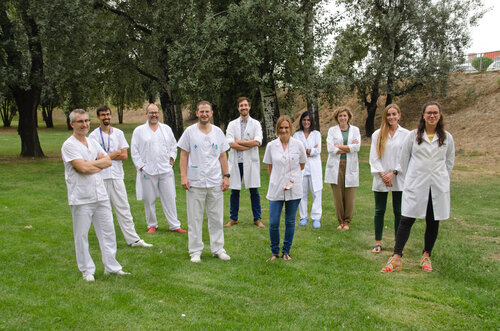New therapeutic avenues for patients with ischaemic stroke described
Research carried out in Lleida by the Clinical Neurosciences and Metabolic Pathophysiology groups
The use of emerging senolytic drugs, which attack senescent or ageing cells, could improve people who have suffered an ischaemic stroke due to a lack of blood flow to the brain. This is according to research by the University of Lleida (UdL) and the Institute for Research in Biomedicine of Lleida (IRBLleida) that has just been published in the journal Scientific Reports. The researchers have described for the first time the senescent role of cells affected by the occlusion of an arterial vessel in a study carried out with mice and human samples. This, according to the authors, opens the door to new therapeutic avenues.
The occlusion of a cerebral artery stops the blood supply to an area of the brain, resulting in an ischaemic stroke. The cells in this area of the brain are deprived of oxygen supply, some die and others acquire a senescent (aged) profile that makes it difficult for the surrounding cells to recover. Precisely, senolytic drugs are responsible for eliminating senescent (aged) cells. Until now, senescent cells had been described in different neurodegenerative diseases such as Alzheimer's or Parkinson's. This recent research, carried out in Lleida by the Clinical Neurosciences group and members of the Metabolic Pathophysiology group of the UdL and IRBLleida, has described, for the first time, the involvement of the senescence response in ischaemic stroke models and therefore determines a new therapeutic approach for patients with ischaemic stroke.
"Until now, therapeutic strategies using senolytics had no evidence for patients who have suffered an ischaemic stroke, because research focusing on senescent cells and ischaemic events had not been studied. Our study highlights for the first time this new therapeutic pathway and points the way for new studies," explained Francesc Purroy, neurologist at the Hospital Universitari Arnau de Vilanova (HUAV), professor at the UdL and head of the Clinical Neurosciences group. "We knew that cellular senescence, which can be a natural anti-tumour protection mechanism, can contribute to forms of neuroinflammation (inflammation within the nervous system). The fact that cerebral ischaemia may contribute will allow us to better understand the development of other age-associated nerve diseases, such as neurodegenerative diseases," explained the professor at the UdL and researcher of the Metabolic Pathophysiology group, Manel Portero.
This research has been possible thanks to grants from the Agència de Gestió d'Ajuts Universitaris de Recerca (2017 SGR 1628), the Instituto de Salud Carlos III (PI17-01725, PI17-00134, PI20-0155 and INVICTUS plus Research Network), the Ministerio de Ciencia, Innovación y Universidades (PFIS; FI18/00319 i FPU16/01446) and European grants (ERDF/ESF "Investing in your future" i FEDER "A way to build Europe").
Torres-Querol, C., Torres, P., Vidal, N. et al. Acute ischemic stroke triggers a cellular senescence-associated secretory phenotype. Sci Rep 11, 15752 (2021). https://doi.org/10.1038/s41598-021-95344-5

The Clinical Neurosciences group






